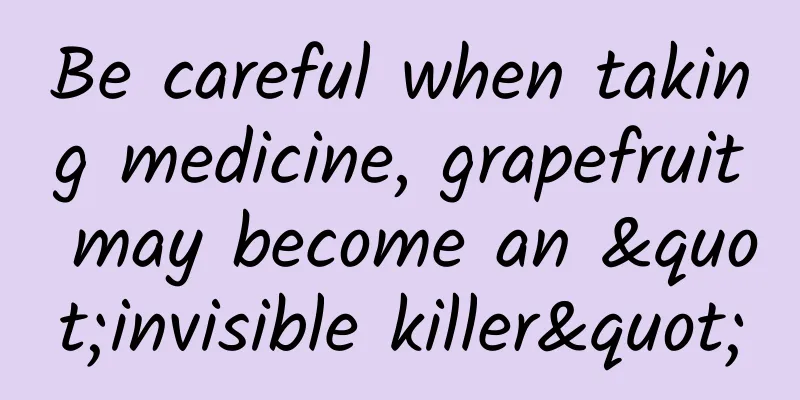Be careful when taking medicine, grapefruit may become an "invisible killer"

|
In this golden autumn season, it is the season for various grapefruits to mature, such as grapefruit, pomelo, and sugar pomelo. Grapefruit has become a favorite of many people for its unique sweet and sour taste and rich nutrients. However, do you know? This seemingly ordinary fruit may produce a "chemical reaction" with some of the drugs you are taking, affecting the effect of the drugs and even causing adverse reactions. In severe cases, it may cause low blood pressure, myolysis, lethargy and even organ damage. This is not alarmist. Today, we will reveal the little-known taboos between grapefruit, grapefruit and your regular medications. As early as 1991, researchers reported the adverse reactions between grapefruit and antihypertensive drugs in the world's authoritative journal The Lancet. On November 26, 2012, Canadian researchers published a paper in the Journal of the Canadian Medical Association, pointing out that more and more drugs are found to cause adverse reactions when taken with grapefruit juice, and may even cause serious side effects such as sudden death. Researchers recommend that people should avoid drinking grapefruit juice and eating grapefruit and other citrus fruits when taking such drugs. The reason why grapefruit can interact with drugs is mainly due to a chemical called "furanocoumarin" it contains. This substance can inhibit certain enzymes in human cells, such as CYP3A4, which is a key drug metabolizing enzyme widely present in the intestinal wall and liver. It is especially widely present in the liver. As we all know, our liver is the main "detoxification" organ. Generally, the drugs taken into the body are metabolized and detoxified by the liver. The CYP3A4 enzyme mentioned above is the main force, responsible for metabolizing about 50% of the commonly used drugs. Once its activity is inhibited, it means that the drug cannot be degraded, resulting in an increase in the amount of drugs entering the blood circulation, which may lead to excessive efficacy or aggravated side effects. At this time, you take the same dosage of drugs as usual, but when it enters the body, it is equivalent to several times the original dose. Some pharmacists point out that taking a glass of grapefruit juice and a tablet of certain drugs is sometimes equivalent to taking 20 tablets of this drug and a glass of water. Inadvertently increasing the dosage of the drug, the drug that was originally used to treat the disease may become a "poison." In fact, not all citrus fruits contain "furanocoumarins". Grapefruit has the highest content. However, due to the complex hybridization relationship between citrus fruits, the content is uncertain and sometimes it is difficult to trace the original varieties. Therefore, it is better to avoid eating citrus fruits during medication for the sake of safety. Well, some people will think that I don't want to eat them together. I eat grapefruit in the morning and take medicine at noon. Is this okay? In fact, it is not possible. The damage to metabolic enzymes is irreversible. The body needs to produce new metabolic enzymes to restore normal metabolic capacity. Generally speaking, it takes 24 hours to restore 50% of the metabolic function, and it takes more time to fully recover. Of course, this is also related to the content of the grapefruit consumed. For example, a single consumption of a whole grapefruit or a small cup of grapefruit juice may increase the concentration of the antihypertensive drug felodipine taken within a few hours by 3 times, so it is not recommended to take grapefruit and other citrus fruits a few days before and after taking the medicine. OK, now that we understand the principle, let's move on to the practical part. Which drugs are most likely to be affected? Category 1: Lipid-lowering drugs, which are the "statins" that you commonly see or take every day, such as atorvastatin, etc., which can cause muscle pain, hematuria, and rhabdomyolysis. The second category: antihypertensive drugs, especially "calcium channel blockers", which are "such and such dipine" type antihypertensive drugs, such as nifedipine and amlodipine besylate, which may cause a sudden drop in blood pressure, resulting in symptoms such as dizziness and palpitations, and may even cause myocardial infarction in severe cases. Category 3: Tranquilizers and sedatives and hypnotics: such as alprazolam, midazolam, etc., when taken with grapefruit will enhance the inhibitory effect on the central nervous system, leading to aggravated symptoms such as dizziness and drowsiness. Category 4: Anti-allergic drugs: such as terfenadine, when taken with grapefruit, may aggravate irritation to the heart, gastrointestinal tract and liver, and cause serious problems such as ventricular arrhythmia. Category 5: Immunosuppressants: such as tacrolimus, cyclosporine, etc., taken together with grapefruit may increase blood drug concentration and cause toxic side effects. Therefore, patients who are taking the above-mentioned drugs must be careful to avoid eating citrus fruits such as grapefruit. Although occasional small amounts of intake may not have immediate serious consequences, for safety reasons, it should be avoided as much as possible. Patients should also regularly monitor liver function, kidney function, creatine kinase and other indicators during medication to understand the efficacy and safety of the drug in a timely manner. If any discomfort occurs, seek medical attention in a timely manner and inform the doctor of the medication and food being taken so that the doctor can make correct judgments and adjustments. |
<<: Why are there more and more patients with cerebral infarction? These are the high-risk factors
>>: If you have itchy 3 places on your body, you may have cancer.
Recommend
What numbers are better for Christmas red envelopes in 2020? What numbers are better for Christmas red envelopes in 2020?
As we all know, Christmas is a very popular Weste...
What should girls eat when they have their period?
When a woman has her period, her body resistance ...
Should I remove the oxygen tube or not?
This is the 4992nd article of Da Yi Xiao Hu There...
Dieting is harmful, it is easy to rebound and hurt your body
Losing weight is an enduring topic. There are man...
Non-sugar sweeteners do not help with weight loss and may pose health risks, says WHO
The World Health Organization reports that non-su...
Cervical smear test and treatment
The cervical problem is undoubtedly a major focus...
Does rock sugar orange increase internal heat or reduce internal heat? When does rock sugar orange ripen?
Rock sugar oranges are rich in vitamin C, caroten...
What should I do if the abortion is still not clean after 20 days?
The so-called medical abortion refers to drug abo...
Can female uterine coldness cause infertility?
Female friends need to be vigilant about the prob...
Abortion test one month weak positive
Many couples are not prepared for pregnancy, and ...
What to do if pregnant women have bloating in the early stage
In the early stages of pregnancy, pregnant women ...
Is it OK to have your period every 40 days?
A normal menstrual period is regular, which is ma...
Can a woman still have a baby at the age of fifty?
The best childbearing age for women is between 25...
Itchy labia
Many people have experienced itching on both side...
At what age do girls start to develop?
Almost all schools now attach importance to the p...









